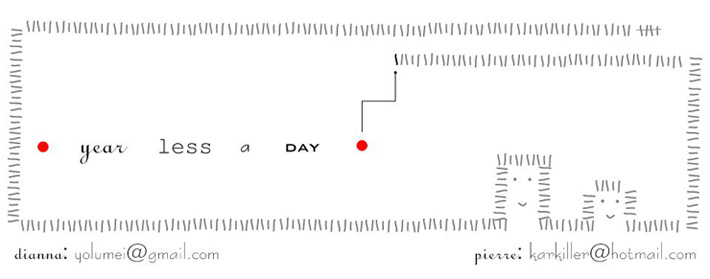On Thursday, Pierre learns that the upcoming weekend is a long weekend. With his free Tuesday, this means that we have 4 days to travel. As mentioned before, we haven't travelled much in China yet, but the one thing I have learned is that things can get very busy when the entire country has a vacation at one time. The Chinese New Year is a notoriously difficult time to travel - picture Christmas holidays in Canada (especially Christmas Eve) but with 1.3 billion billion people. Some people want to see family, some people want to travel abroad, but it seems like half of the population is trying to get somewhere else.
This long weekend is slightly different - the holiday is called "Qing Ming Jai" which seems to translate to "Clean Bright Festival" but which all of the foreigners seem to refer to a Tomb Sweeping Day. From what I understand, it marks the arrival of spring, people go outside and enjoy nature, and most importantly, people tend to the family graves. Everyone we talk to suggests that it's not a crazy time to travel, so we decide to get out of Huizhou.
At first we're pretty ambitious. We toss around the idea a ten-hour overnight bus ride to a beautiful village well-known for its scenery and hiking. When Pierre returns from his next class, he's got reservations about that idea. He asked his students what they think of the village, they're not enthusiastic. Not very interesting, they say.
I take this with a grain of salt. "Their idea of interesting might be very different from ours," I say. "Maybe rural China just isn't all that exotic for them."
Pierre sees my point. "I guess they did suggest I go to Hong Kong for the shopping."
Eventually, we toss the hiking idea back into the "maybe later" pile. We settle on a four-hour bus ride to Macau.
Macau isn't somewhere I had planned to visit. The word I hear most often in association with "Macau" is "casino." It seems that Macau plays the role of Las Vegas/Montecarlo for this part of Asia. However, the guidebook also promises Portugese architecture and a small city that sounds very pedestrian friendly. I'm really not sure what to expect.
Arriving somewhere new is inevitably inconvenient. Where's the hotel, where's the bus, where's the money exchange, which way's north... With Macau, I am concerned about the additional detail of having to deal with a border crossing but we arrive at the bus station and discover the border is about 100 metres from the bus station. We cross the street, enter the building, fill out the usual exit/entry cards, get in line and within 20 minutes of arriving on the bus we've made it through customs to Macau.
I don't know exactly what I expected from Macau. I probably thought it would be more like Hong Kong - big, crowded, bright, flashy, flat, widespread, expensive. It's none of these things. Instead it is bite-sized: hilly, paved with cobblestones, easy to walk, easy on the eyes, and not crowded. While walking towards the center of town, another tourist mentions that he's never seen it this quiet. We walk through the main plaza:

In the picture above, the street looks terribly deserted. This is because Pierre always patiently waits for things to clear out before he takes a picture. The moment after the picture is taken, a elderly man and his wife stroll past us, a family walks out of the cookie store, a scooter drives past, a few tourists walk out of a hostel. This prostitution street is remarkably cozy and safe in the day and early evening.
We end up staying at a hospedaria that gives us the most reasonable price (around 50 CN$ a night). We use Mandarin to negotiate and check in, which goes as smoothly as can be expected and when we get to the room we immediately unplug the phone so no one can call and wake us up in the middle of the night to offer us their services. There are 2 cell phone numbers written on the wall next to the bed and and we're woken up once by the sounds of an enthusiastic working girl down the hall. (Pierre the engineer explains to me that a floating ceiling tends to encourage noise drift).
The hostel has the funkiest key we've seen so far: it slides into the top of the door knob.


We walk up and down the narrow streets:
We look down:

(note the sad dog checking us out through the railings - banished to the church's patio?)
We walk through parks:
We try out all of the wacky (yet brilliant) free exercise machines in the parks:



We do a bit of sightseeing and check out the ruins of St. Paul, which is all that remains of the St. Paul Cathedral, the majority of which burnt down in the 1830s:




 ...and to temples:
...and to temples: 




We stumble across an odd theme-mall which includes a mini replica of the Coliseum:

...and a general mish-mash of history and architecture:




...and, as always, we eat and eat and eat. We discover that Macau is famous for a certain kind of almond cookie - we see tourists with bags and bags of cookie boxes. We also discover that if you go into a certain chain of stores (Koi Kei Bakery), not only do they have generous and fresh samples of all of their products available for customers, but that they'll give you a full size, fresh-from-the-oven sample of their signature cookie. Every time you go in. Brilliant.





















 (We're not sure exactly what type of berry this is - possibly something from the blackberry family, though much tinier and more delicate.)
(We're not sure exactly what type of berry this is - possibly something from the blackberry family, though much tinier and more delicate.)

